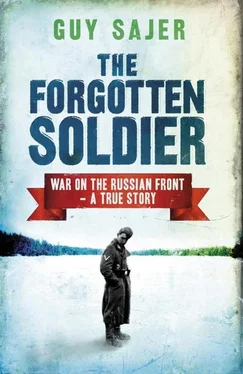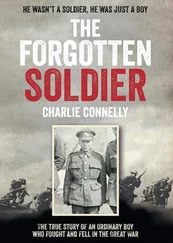I feared for these children, who were being punished before they had committed any crime, for whom the idea of existence would become synonymous with vengeance. I could do nothing but watch this tragic procession; even my life would be no help to them. I was not a redeeming Christ, and in any case I had discovered very good reasons for dying.
We reached Danzig three days after crossing the ice of the Frisches Haff. Everything was calm in the city, despite the tragic spectacle of hundreds of thousands of refugees. The war was to the south of us, so that we even escaped its noise, although frequent air raids struck at the heart of the crowded city. Danzig had become the terminal point of the Prussian exodus, and, although huge crowds were living day and night without shelter, there was nonetheless a substantial and organized effort to help them. It was still possible to leave for the West by rail, and the port was still open to maritime traffic. We waited down by the docks, in a dense mass of vagabonds.
Wollers went to a center which should have been able to give us some information about reintegrating with our group. He waited for several hours under its flattened glass roof. I myself was in no hurry to move on, as the stiff folds of my boot pressed painfully against my swollen ankle.
A large ship had come into Neufahrwasser, and the crowd had flowed toward the pier. The ship had not yet cast off its mooring lines, and everyone would have to wait for several hours before they were loosed again, but in Danzig then time counted for nothing. Each aim was stubbornly pursued, even at the cost of maximum patience, endurance, and suffering.
As always, there were children, with their small faces twisted by emotion, staring and hating without comprehension, and without looking for any explanations. When sleep overwhelmed them, they slept where they were, without any release from trouble. I, immobilized by exhaustion and by my sense of solitude, tried to see no more than the seagulls did, as they flew overhead, seemingly part of another world.
For two days now, we had been waiting for some information, or some instructions, under the shattered glass structure of the station. A wind which made the inside as cold as the outdoors shook the metal frame, loosening and scattering the remaining glass fragments. We had to keep walking and waving our arms to avoid freezing on the spot. As it was very hard for me to walk, my comrades gave me a permanent place inside, while they took turns walking through the rubble of the port. Finally a piece of negative information reached us: there were no Gross Deutschland units in Danzig; perhaps they had moved on to Gotenhafen. Gotenhafen was several miles to the north, on the bay only a short walk, if my foot would support me.
With the aid of Hals and my broomstick crutch, I managed to cross part of the town. On the way, Providence intervened to help us. Some civilians who had been watching us from their house came out to meet us, and took us back indoors. The house was warm, and it seemed as if the gates of Paradise had opened to receive us. There was already a crowd of people in the house — refugees from the East, including large numbers of silent children, who seemed to relish the wall bench on which they were sitting as if it were a marvelous toy.
There was water in the house, and our hosts offered us the opportunity to wash. Wollers knew that soldiers had no right to the privileges reserved for fleeing civilians. But his dressing was a mass of putrefaction, and his body was so exhausted he didn’t know how to refuse. Even I was able to soak my swollen ankle in a basin of hot water. The owners of the house insisted that we rest there overnight and, in the evening, produced something for us to eat.
We spent the night in the warmth of the cellar. Unfortunately, we were so unused to being warm that we couldn’t appreciate it as much as we should have. We shook uncontrollably for seconds at a time, as if some form of warning system were on continuous alert inside our heads. Our exhaustion, which we had been keeping more or less suppressed, broke out during this period of unaccustomed rest. Lindberg trembled for minutes at a time. Hals felt so lost if he fell asleep lying down that he spent the night propped against the wall, whimpering. As for me, I was racked down the length of my body with pains which seemed to rise and fall as I breathed.
Were we no longer able to function like normal human beings? This was certainly possible. However, one development struck me as extremely favorable. The three hot soakings I was able to give my foot put an end to the trouble in record time. Perhaps, when our bodies have been deprived of practically everything, they react favorably to the most elementary care. Then, the most desperately wounded clung to life after a glass of schnapps and a promise; today, a simple cold can flatten a healthy man for several days. Then, we were certainly not supermen, but men, in the most real and complete sense in the world.
In the morning, we took leave of our benefactors, who told us that their last reserves had been exhausted, and that they were planning to leave Danzig and flee to the West while there was still time.
With daybreak, which came late, the first fighter-bombers appeared and attacked the port, and we said goodbye against the roar of explosions and the barking of flak. We resumed our march toward Gotenhafen, sharing the road with an unbroken column of civilians, who were all moving west, as Danzig could no longer be considered safe. Others were moving north, following the coast to Hela, a port opposite Gotenhafen, which was used almost as heavily as Danzig.
Gotenhafen, about a month before its destruction, was a collection point for wounded men, who were then sent on to villages and hamlets inland. Others passed through it, to continue on the next lap of their miserable route, as always or foot. Hela was the next stop, some thirty miles beyond Gotenhafen.
We questioned the groups of soldiers we met along the way. No one knew anything or had seen any trace of our unit. Someone suggested the assembly center, but when we got there we hesitated to ask any questions of the harried officials, who had been overtaken by the course of events. A rumor was circulating through the throng of refugees: a large ship had been sunk a few days earlier, almost certainly after a torpedo attack. It had been crammed with refugees, relieved to be escaping to a region of greater security. It was easy to imagine the horror of the scene, in the black and icy night.
The news of this disaster had been officially withheld, but had nonetheless penetrated to the anxious mob, for whom the sea route was the last hope of escape. The ship in question was thought to be the Wilhelm-Gustlojff .
We had still been unable to obtain any information about our unit. Finally, we were reincorporated in a defense battalion which, with civilian aid, was constructing a line of defense to the west of Zoppot.
We dug in, some twenty miles inland. I had no idea where the enemy was, but it seemed to me that the positions we were organizing faced the wrong way. The anti-tank and anti-aircraft guns pointed west and southwest — the only directions in which retreat was possible. I couldn’t understand it — but that made no difference! It wasn’t the first time, and others were undoubtedly thinking for us.
Aside from the problem of civilian refugees, overflowing from every farmhouse and outbuilding, life was much easier here. The Prussian farmers continued to function with order and discipline, despite the anxiety which visibly marked their faces. The future looked dark, and the miracle which yesterday might have saved them now seemed much less possible. Despite orders to avoid despair and panic, and despite an effort to continue life as usual in the rush of the exodus, these people were quietly and surreptitiously beginning to liquidate their stocks, rather than lose them to the enemy. Many cattle were slaughtered for food, which later proved to have been wisely done. A short time after that, cattle were collapsing and dying by the hundreds on the frozen soil.
Читать дальше












